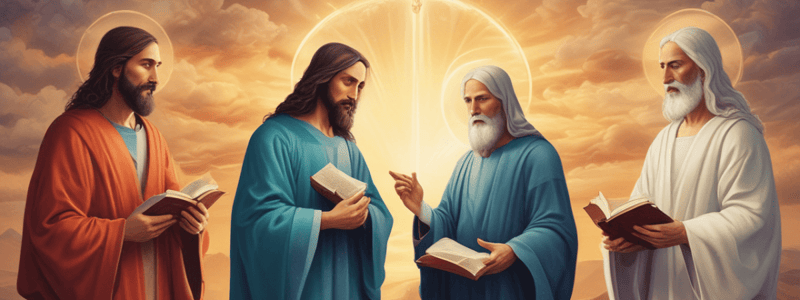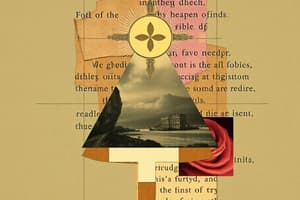Podcast
Questions and Answers
The diagram proposed is circular in shape.
The diagram proposed is circular in shape.
False (B)
The Father is the Mediator in the functional subordination diagram.
The Father is the Mediator in the functional subordination diagram.
False (B)
The text suggests that the Son is not eternally the Son of God.
The text suggests that the Son is not eternally the Son of God.
False (B)
The prepositions 'of', 'through', 'by', and 'to' are used to describe the functional subordination of the Trinity.
The prepositions 'of', 'through', 'by', and 'to' are used to describe the functional subordination of the Trinity.
The Spirit is the Initiator in the functional subordination diagram.
The Spirit is the Initiator in the functional subordination diagram.
The text argues that the Son is not fully God.
The text argues that the Son is not fully God.
Economic subordination implies that the Son is not eternally subordinate to the Father.
Economic subordination implies that the Son is not eternally subordinate to the Father.
The functional subordination diagram is an exegesis of 1 Corinthians 8 and Ephesians 2.
The functional subordination diagram is an exegesis of 1 Corinthians 8 and Ephesians 2.
Co-inherence implies that the members of the Trinity are not fully distinct.
Co-inherence implies that the members of the Trinity are not fully distinct.
The text suggests that the Father, Son, and Spirit are not fully equal in their ontology.
The text suggests that the Father, Son, and Spirit are not fully equal in their ontology.
The Father is eternally the Father and the Son is eternally the Son.
The Father is eternally the Father and the Son is eternally the Son.
The formula for the Trinity is 'eternal equality in being, but subordination in role'.
The formula for the Trinity is 'eternal equality in being, but subordination in role'.
The sonship of Jesus Christ is the most important aspect of Christology.
The sonship of Jesus Christ is the most important aspect of Christology.
The Old Testament foretold the death, resurrection, and ascension of Jesus Christ.
The Old Testament foretold the death, resurrection, and ascension of Jesus Christ.
The suffering servant in Isaiah 53 is a clear definition of substitutionary atonement.
The suffering servant in Isaiah 53 is a clear definition of substitutionary atonement.
According to Zechariah 13:1, a fountain will be opened for the house of Israel for sin and for impurity.
According to Zechariah 13:1, a fountain will be opened for the house of Israel for sin and for impurity.
The resurrection of Jesus Christ is mentioned in Psalm 2 and Acts 2.
The resurrection of Jesus Christ is mentioned in Psalm 2 and Acts 2.
The Trinity is not a crucial aspect of Christian theology.
The Trinity is not a crucial aspect of Christian theology.
Genesis 22:9 is often compared to Hebrews 11:19 to illustrate the concept of resurrection.
Genesis 22:9 is often compared to Hebrews 11:19 to illustrate the concept of resurrection.
The importance of the death, resurrection, and ascension of Jesus Christ lies in their frequency of mention in the Bible.
The importance of the death, resurrection, and ascension of Jesus Christ lies in their frequency of mention in the Bible.
Psalm 16:10 suggests that death will hold the Messiah.
Psalm 16:10 suggests that death will hold the Messiah.
Job 14:14 asks the question 'Shall we love again?'
Job 14:14 asks the question 'Shall we love again?'
The concept of sonship is more important than the death, resurrection, and ascension of Jesus Christ.
The concept of sonship is more important than the death, resurrection, and ascension of Jesus Christ.
Isaiah 52:13-53:12 is a fascinating passage of Scripture that deals with the Messiah.
Isaiah 52:13-53:12 is a fascinating passage of Scripture that deals with the Messiah.
Isaiah 53:10 is seen as referring to the death and burial of the Messiah.
Isaiah 53:10 is seen as referring to the death and burial of the Messiah.
Psalm 68:18 is a clear reference to the ascension of the Messiah.
Psalm 68:18 is a clear reference to the ascension of the Messiah.
Matthew 16:16 is a clear explanation of the death and resurrection of the Messiah by Jesus himself.
Matthew 16:16 is a clear explanation of the death and resurrection of the Messiah by Jesus himself.
Luke 19:31 is a reference to the transfiguration account and the discussion of the resurrection.
Luke 19:31 is a reference to the transfiguration account and the discussion of the resurrection.
Daniel 12:2 is a plain expression of resurrection, stating that many who sleep in the dust will awake to eternal life or shame and contempt.
Daniel 12:2 is a plain expression of resurrection, stating that many who sleep in the dust will awake to eternal life or shame and contempt.
Matthew 17:22 is a clear instruction on the gathering of the disciples in Galilee after the resurrection.
Matthew 17:22 is a clear instruction on the gathering of the disciples in Galilee after the resurrection.
Jesus' resurrection was predicted in John 2 and John 12.
Jesus' resurrection was predicted in John 2 and John 12.
The disciples fully understood Jesus' clear instructions about his death and resurrection during the gathering in Galilee.
The disciples fully understood Jesus' clear instructions about his death and resurrection during the gathering in Galilee.
The ascension is an event that is not distinct from the resurrection.
The ascension is an event that is not distinct from the resurrection.
The centurion verified that Jesus was indeed dead before releasing the body to Joseph of Arimathea.
The centurion verified that Jesus was indeed dead before releasing the body to Joseph of Arimathea.
R.A. Torrey described the resurrection as a peripheral aspect of Christian doctrine.
R.A. Torrey described the resurrection as a peripheral aspect of Christian doctrine.
The testimony of 500 eyewitnesses at one time is a specific testimony to Jesus' death and resurrection.
The testimony of 500 eyewitnesses at one time is a specific testimony to Jesus' death and resurrection.
Jesus' death and resurrection were not explicitly mentioned in the Book of Mark.
Jesus' death and resurrection were not explicitly mentioned in the Book of Mark.
The ascension is only possible because of the resurrection.
The ascension is only possible because of the resurrection.
Peter Toon wrote a series of articles on Christ's ascension in Bibliotheca Sacra in 1983 and 1984.
Peter Toon wrote a series of articles on Christ's ascension in Bibliotheca Sacra in 1983 and 1984.
The resurrection is not a fundamental aspect of Christian doctrine.
The resurrection is not a fundamental aspect of Christian doctrine.
Flashcards are hidden until you start studying
Study Notes
Functional Subordination in the Trinity
- The diagram proposes a triangular relationship between the Father, Son, and Spirit based on prepositions in 1 Corinthians 8 and Ephesians 2.
- The Father initiates, the Son mediates, and the Spirit is the agent, with the plan ultimately returning to the Father.
- This functional subordination does not imply a lack of ontological equality among the persons of the Trinity.
- If there is no economic subordination, there is no distinction of persons, and the Trinity does not eternally exist.
- Therefore, there is an economic subordination (role-based distinction) and ontological equality (equality in being) within the Trinity.
The Sonship of Jesus Christ
- Jesus Christ is eternally the Son, and his role as Mediator is key to understanding the Trinity.
- Avoid redefining the concept of sonship, but instead, sharpen the definition as you continue to study and reflect on it.
Death, Resurrection, and Ascension of Christ
- The death, resurrection, and ascension of Christ are foretold in the Old Testament, including in Isaiah 52-53, Psalm 22, Daniel 9, and others.
- These events are also clearly explained by Christ himself in the Gospels, such as in Matthew 16, 17, and Luke 19.
- The resurrection is a key aspect of Christ's plan, and without it, there would be no ascension.
- The ascension is seen as a distinct event, with Christ returning to the Father, and is foretold in Psalm 68, 110, and other passages.
Testimony to the Death, Resurrection, and Ascension
- The angels in the tomb, the disciples on the Emmaus Road, and 500 eyewitnesses at one time all testified to the death and resurrection of Christ.
- The apostles, including Peter and Paul, also testified to these events in their preaching and teaching.
- The centurion's verification of Christ's death before releasing the body to Joseph of Arimathea is an important footnote to the crucifixion story.
The Importance of the Resurrection
- The resurrection is the cornerstone of Christian doctrine, the Gibraltar of Christian evidence, and the Waterloo of infidelity (R.A. Torrey).
- Denying the resurrection would remove the foundation of Christian faith.
- The resurrection stands as a rock, unmoved and unwearing, and is a key aspect of Christian theology.
Studying That Suits You
Use AI to generate personalized quizzes and flashcards to suit your learning preferences.




